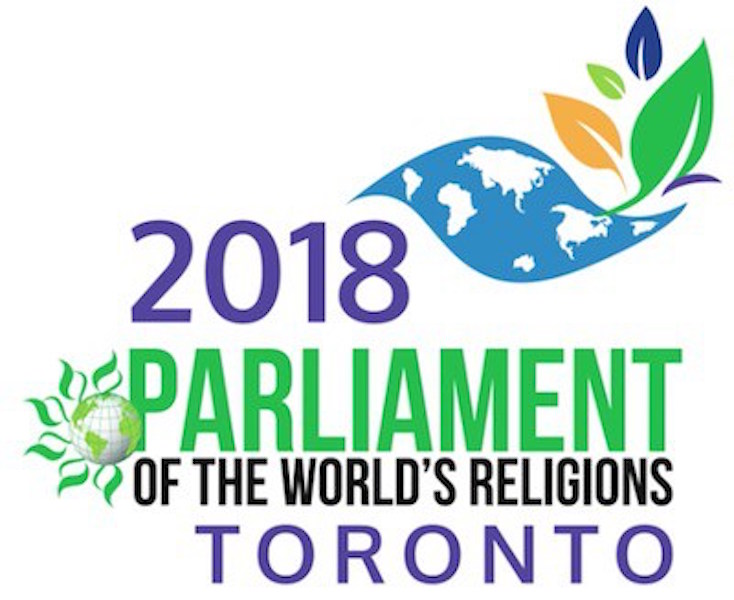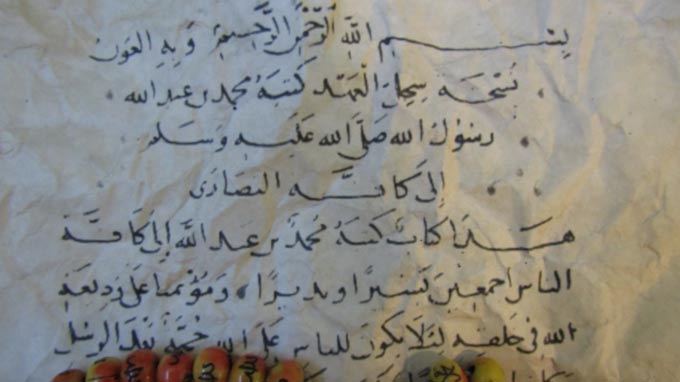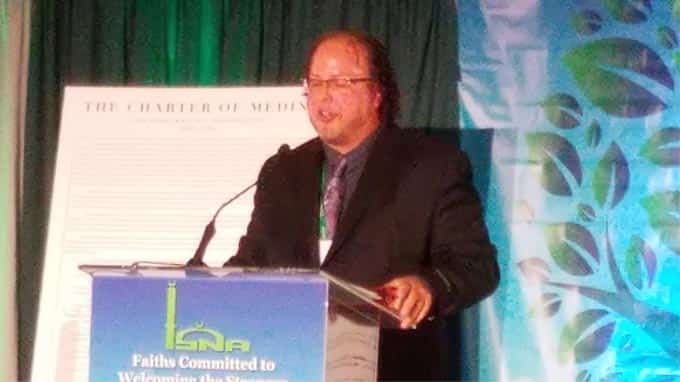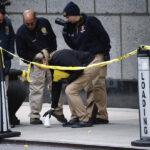The seventh Parliament of the World’s Religions, the oldest, largest, most diverse and inclusive global interfaith event, was held in Toronto, Ontario, Canada, between November 1 and November 7, 2018. The conference, which was themed, “The Promise of Inclusion, the Power of Love: Pursuing Global Understanding, Reconciliation, and Change,” was attended by over 10,000 people of faith and conscience from 80 different nations, and featured over 500 programs and events.
One particular panel, titled “An Offering of the Covenants of the Prophet Muhammad in the 21st Century,” featured Charles Upton, the American Sufi scholar, his wife, Jenny Doane Upton, another accomplished thinker and writer, Dr. Craig Considine, the sociologist and interfaith activist from Rice University, as well as Dr. John Andrew Morrow, the author of The Covenants of the Prophet Muhammad with the Christians of the World. After invoking God, and sending blessings upon the Prophet Muhammad and his family, Dr. Morrow shared the following words with the audience:
We are gathered here today to honor the tradition of the Prophet Muhammad and the tradition of the Assyrian Christians from the region of Mesopotamia. Like dozens upon dozens of other communities, who sought the Messenger of Allah out after he proclaimed prophecy, knowing full well that a prophet was set to surface in Arabia, the Assyrians sent a delegation to meet with him. As was his custom, the Prophet had written to Sa‘id, a Christian tribal leader, inviting him and his people to embrace the teachings of Islam. Sai‘d, along with Jahb Alahah, who was a bishop, set off on the long journey to Arabia where he agreed to submit to the Prophet’s authority and pay tribute in exchange for enjoying the freedom to continue practicing Christianity. The Messenger of Allah granted a special firman to the Church of the East along with a beautifully ornate dagger.
You may be interested
The document in question, the Covenant of the Prophet Muhammad with the Assyrian Christians, was passed down from Patriarch to Patriarch from the seventh century until the nineteenth century. For as long as history records, the Covenant of the Prophet was at the center of religious devotion in the Assyrian Homeland, located in what is now part of northern Iraq, southeastern Turkey, and northwestern Iran. Revered as a sacred relic, the Covenant of the Prophet was stored in the Cathedral of Mar Zaia in the city of Jilu. Once per year, as long as history records, a Muslim cleric would visit the city and would read the document in the public assembly for all to hear and for all to remember. Over half a dozen military officers, missionaries, scholars, and explorers who visited the Assyrian Homeland in the 19th century attested to the existence of the Covenant of the Prophet Muhammad with the Assyrian Christians, described its physical appearance, and conveyed its content. None of them called its authenticity into question. Over twenty scholars, specialists, experts, authorities, and authors who studied the Assyrian Covenant in the 20th and 21st century also came to the same conclusion, namely, that it was both genuine and historically sound.
From the time of the Prophet Muhammad in the seventh century to the time of the Ottoman Empire in the 19th century, the Assyrians were treated as a millah, namely, as an autonomous Christian community, that belonged to the Confederation of Believers that was the Ummah or Motherland of Abraham. This extended period of co-existence that spanned fourteen centuries was brought to an abrupt end as a result of the Great Game, namely, the meddling of Western European powers in Middle Eastern affairs, that had one aim and one aim alone, to manipulate all sides in order to destabilize, destroy, and divide the Muslim world. The Assyrian and Armenian Christians would be sacrificed to attain this goal. The Kurds, under Bedr Khan Beg, were unleashed upon the Assyrians. According to the Mar Shimun Patriarchs, the Kurds stole the satchel containing the Covenant and Dagger of the Prophet in the mid-1800s and turned it over to Bedr Khan. According to British forces, however, the Covenant of the Prophet was stolen by the Turks in 1899. Either way, the Covenant of the Prophet was stolen or destroyed prior to the Assyrian Massacres of 1843 and 1846 or prior to the Assyrian Atrocities of 1915. In any case, the violation of the Covenant of the Prophet on the part of the Kurds and Turks was an act of apostasy.
In memory of the Prophet Muhammad, peace and blessings be upon him and his family, and the rights and privileges he provided to Christian communities, let us reenact the ritual reading of the Covenant of the Prophet Muhammad with the Assyrian Christians, as was celebrated on a yearly basis in the Assyrian Homeland for fourteen centuries:
God has told me in a vision what to do, and I confirm His Command by giving my solemn promise to keep this agreement.
To the followers of Islam, I say: Carry out my command, protect and help the Christian nation in this country of ours and in their own land.
Leave their places of worship in peace; help and assist their chief and their priests when in need of help, be it in the mountains, in the desert, on the sea, or at home.
Leave all their possessions alone, be it houses or other property. Do not destroy anything of their belongings. The followers of Islam shall not harm or molest any of this nation, because the Christians are my subjects, pay tribute to me, and will help the Muslims.
No tribute, but what is agreed upon, shall be collected from them. Their church buildings shall be left as they are; they shall not be altered. Their priests shall be permitted to teach and worship in their own way — the Christians have full liberty of worship in their churches and homes.
None of their churches shall be torn down, or altered into a mosque, except by the consent and free will of the Christians. If anyone disobeys this command, the anger of Allah and His Prophet shall be upon him.
The tribute paid by the Christians shall be used to promote the teachings of Islam and shall be deposited in the treasury. A common man shall pay one dinar, but the merchants and people who own mines of gold and silver and are rich shall pay twelve dinars. Strangers and people who have no houses or other settled property shall not have taxes levied upon them. If a man inherits property, he shall pay a settled sum to the treasury.
The Christians are not obliged to make war on the enemies of Islam, but if enemies attack the Christians, the Muslims shall not deny their help, but give them horses and weapons, if they need them, and protect them from evils from outside and keep the peace with them. The Christians are not obliged to become Muslims, until God’s will make them believers.
The Muslims shall not force Christian women to accept Islam, but if they themselves wish to embrace it, the Muslims shall be kind to them.
If a Christian woman is married to a Muslim and does not want to embrace Islam, she has liberty to worship at her own church, according to her own religious beliefs, and her husband must not treat her unkindly on account of her religion.
If anyone disobeys this command, he disobeys God and His Prophet and will be guilty of a great offense.
If the Christians wish to build a church, their Muslim neighbors shall help them. This shall be done, because the Christians have obeyed us and have come to us and pleaded for peace and mercy.
If there be among the Christians a great and learned man, the Muslims shall honor him and not be envious of his greatness.
If anyone is unjust and unkind to the Christians, he will be guilty of disobeying the Prophet of God.
The Christians should not shelter an enemy of Islam or give him a horse, a weapon or any other help.
If a Muslim is in need, the Christian shall for three days and nights be his host and shelter him from his enemies.
The Christians shall, furthermore, protect the Muslim women and children and not deliver them up to the enemy or expose them to view.
If the Christians fail to fulfill these conditions, they have forfeited their right to protection, and the agreement is null and void.
This document shall be entrusted to the Christian chief and head of their church for safe keeping.
Professor Morrow was followed by Dr. Craig Considine, who presented cases of Christians protecting Muslims, and Charles Upton, who passionately condemned the United States for its support of Takfiri terrorists who, in his words, were destroying his religion. The final speaker was Jennifer Doane Upton, who presented a perennialist perspective on Christianity and Islam. Towards the end of her speech, she stated that:
I am not a well-known Christian leader or hierarch, representing this or that particular church; if I were, some might accuse the Muslims of the Covenants Initiative of favoring one Christian denomination over another, perhaps in order to divide and conquer. But because I am, as it were, a nobody, I can hopefully step aside, and let the whole spirit of Christianity – the church militant, the church suffering, and the church triumphant – accept these Covenants in my place…
The Church is indeed “a voice crying in the wilderness” in these days. However, as Jesus Christ reminds us, “If the world hates you, know that it hated Me first; but be of good cheer, because I have overcome the world.” As exiles in our own lands, Christians must accept and welcome sincere efforts of help and defense wherever they can find them.
At this point, Dr. John Andrew Morrow, stepped forward, stating:
On behalf of all Muslims who know and accept our Prophet’s love for Jesus and his followers, we offer you the Covenants of the Prophet Muhammad with the Christians of the World.
After accepting the Covenants of the Prophet, Jennifer Doane Upton, replied:
I am honored to receive, from the Muslims of the Covenants Initiative, their friends and their allies, this offering of the Covenants of the Prophet Muhammad to the Christians of the world in the 21st century. As Jesus said to St. John the Evangelist in the Gospel according to Mark, “He who is not against us is for us.”
We can only pray that more Muslims and Christians will follow this example, established by the Prophet Muhammad himself, and enter into the bonds of brotherhood, sisterhood, and friendship with one another, granting, and accepting, treaties, alliances, and covenants, and vowing to protect one another from their common enemies who are enemies of all faiths. Peace and justice are both possible. The Prophet Muhammad has shown us the path.














